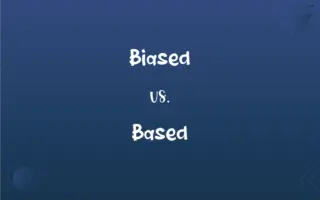Clonus vs. Myoclonus: What's the Difference?
By Janet White & Aimie Carlson || Updated on May 20, 2024
Clonus involves rhythmic, involuntary muscle contractions, while myoclonus refers to sudden, brief, involuntary muscle jerks.

Key Differences
Clonus is a neurological condition characterized by rhythmic, oscillatory involuntary muscle contractions and relaxations. It often indicates a disturbance in the central nervous system and is typically seen in conditions such as multiple sclerosis, stroke, or spinal cord injury. Myoclonus, on the other hand, involves sudden, brief, shock-like involuntary muscle jerks. These jerks can occur in healthy individuals, such as hiccups or the sudden jerks experienced while falling asleep (hypnic jerks).
While clonus involves rhythmic and sustained contractions, myoclonus is characterized by its sudden, brief, and unpredictable nature. Clonus usually affects larger muscle groups and is often triggered by movement or muscle stretch, whereas myoclonus can affect any muscle group and occurs spontaneously or in response to stimuli.
In clinical settings, clonus is often tested by rapidly dorsiflexing the foot and observing the rhythmic contractions. Myoclonus may be evaluated through patient history, physical examination, and diagnostic tests like EEG or EMG to determine the underlying cause.
Both clonus and myoclonus indicate abnormal nervous system activity, but their presentation, triggers, and associated conditions differ significantly. Understanding these distinctions helps in diagnosing and managing the underlying neurological issues.
Comparison Chart
Definition
Rhythmic, involuntary muscle contractions
Sudden, brief, involuntary muscle jerks
ADVERTISEMENT
Nature of Movement
Rhythmic and sustained
Sudden and brief
Common Causes
CNS disorders (e.g., MS, stroke)
Various, including epilepsy and metabolic disorders
Affected Muscles
Often larger muscle groups
Can affect any muscle group
Trigger
Movement or muscle stretch
Spontaneous or in response to stimuli
Clonus and Myoclonus Definitions
Clonus
Rhythmic, oscillatory muscle contractions due to CNS disturbance.
The patient exhibited clonus in the ankle following a stroke.
ADVERTISEMENT
Myoclonus
Sudden, brief, involuntary muscle jerks.
She experienced myoclonus while drifting off to sleep.
Clonus
Tested by rapidly dorsiflexing the foot.
The neurologist checked for clonus by manipulating the patient’s ankle.
Myoclonus
May be associated with epilepsy or other neurological conditions.
Myoclonus is a symptom seen in certain forms of epilepsy.
Clonus
Often persistent and triggered by specific actions.
Clonus occurred every time his foot was dorsiflexed.
Myoclonus
Diagnosed through clinical history and tests like EEG.
The doctor used an EEG to diagnose the cause of her myoclonus.
Clonus
Typically involves larger muscle groups.
Clonus was observed in her knee after a spinal cord injury.
Myoclonus
Occurs spontaneously or in response to stimuli.
Loud noises sometimes triggered his myoclonus.
Clonus
Indicates hyperexcitability of motor neurons.
Clonus can be a sign of multiple sclerosis.
Myoclonus
Can occur in healthy individuals or indicate a disorder.
Hiccups are a common form of myoclonus.
Clonus
An abnormality in neuromuscular activity characterized by rapidly alternating muscular contraction and relaxation.
Myoclonus
A sudden irregular twitching of muscles or parts of muscles, occurring in various brain disorders.
Clonus
(medicine) A muscular spasm with regular contractions.
Myoclonus
(medicine) The brief, involuntary twitching of a muscle or group of muscles.
Clonus
A series of muscular contractions due to sudden stretching of the muscle, - a sign of certain neuropathies.
Myoclonus
A clonic spasm of a muscle or muscle group
Clonus
Convulsion characterized by alternating contractions and relaxations
FAQs
What is myoclonus?
Myoclonus refers to sudden, brief, involuntary muscle jerks.
What causes clonus?
Clonus is caused by CNS disorders such as multiple sclerosis, stroke, or spinal cord injury.
Can myoclonus be a normal phenomenon?
Yes, it can occur in healthy individuals, such as during hiccups or sleep.
Can clonus occur in healthy individuals?
Clonus is typically associated with underlying neurological issues.
What is clonus?
Clonus is a condition involving rhythmic, involuntary muscle contractions.
What are common triggers for myoclonus?
Myoclonus can be spontaneous or triggered by stimuli like sound or light.
How is clonus tested?
By rapidly dorsiflexing the foot and observing rhythmic contractions.
Does clonus affect specific muscle groups?
It often affects larger muscle groups, particularly in the legs.
Can myoclonus indicate a serious condition?
Yes, it can be a symptom of neurological disorders like epilepsy.
How is myoclonus different from clonus in terms of duration?
Myoclonus is brief, while clonus is rhythmic and sustained.
Can myoclonus affect any muscle group?
Yes, myoclonus can affect any muscle group.
Is clonus sustained or brief?
Clonus involves rhythmic and sustained contractions.
What diagnostic tools are used for myoclonus?
EEG and EMG are commonly used to diagnose myoclonus.
What neurological conditions are associated with clonus?
Multiple sclerosis, stroke, and spinal cord injuries.
Can lifestyle changes help manage myoclonus?
Yes, stress management and avoiding triggers can help.
How is clonus related to motor neurons?
It indicates hyperexcitability of motor neurons.
Is clonus more common in certain parts of the body?
It commonly affects the legs, particularly the ankles.
Is myoclonus rhythmic?
No, myoclonus is characterized by sudden and brief movements.
What are common treatments for myoclonus?
Treatments may include medications like anticonvulsants.
What is a typical presentation of clonus?
Rhythmic tapping of the foot when the ankle is dorsiflexed.
About Author
Written by
Janet WhiteJanet White has been an esteemed writer and blogger for Difference Wiki. Holding a Master's degree in Science and Medical Journalism from the prestigious Boston University, she has consistently demonstrated her expertise and passion for her field. When she's not immersed in her work, Janet relishes her time exercising, delving into a good book, and cherishing moments with friends and family.
Co-written by
Aimie CarlsonAimie Carlson, holding a master's degree in English literature, is a fervent English language enthusiast. She lends her writing talents to Difference Wiki, a prominent website that specializes in comparisons, offering readers insightful analyses that both captivate and inform.































































